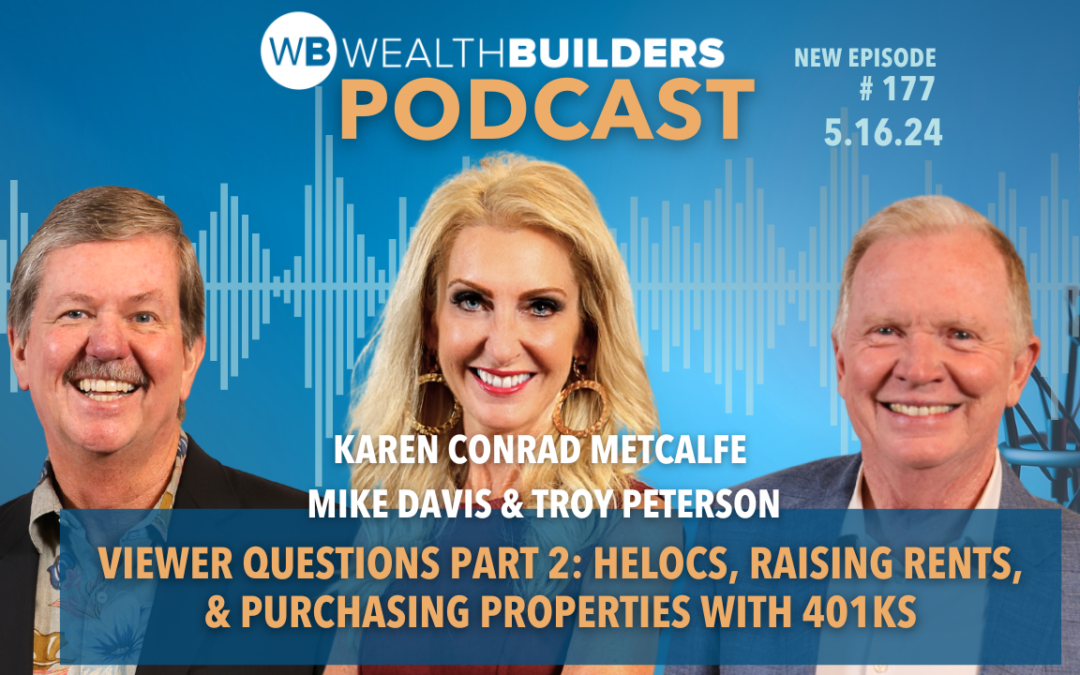As the old saying goes, “You don’t know what you don’t know.” Yet, once you get in the game, it becomes a lot easier to know the right questions to ask! In this episode of The WealthBuilders Podcast, the WB Coaches continue to answer questions from our viewers. This week, it’s all about real estate.
Click the player below to watch, or listen on your preferred podcast platform. Then, keep scrolling for this episode’s shownotes!
(Did you miss last week’s episode? Click here to watch Part 1!)
Podcast Shownotes: HELOCs, Raising Rents, and Purchasing Properties with 401ks
Which is better, a cash-out refinance or a HELOC?
- It depends on your situation. If it’s an investment property, a cash-out refinance is usually better. If it’s your personal home, a HELOC works because you’re not locked into a long-term and you can use it to purchase an investment that pays off your HELOC quickly.
- Interest rates are another thing to take into consideration. If you have a good interest rate on your current mortgage, you don’t want to refinance anything that would mess with that. Related: How to Use Home Equity to Build Wealth
How can you walk in debt freedom while also owning multiple homes with loans?
- Think of investment real estate as leverage, not debt. If your investments are cash flowing above and beyond the mortgage and management fees every month, you have nothing to worry about.
- The Hebrew mindset of the Old Testament says that debt is a good thing if it generates income. It’s a bad thing if it’s a liability, so you need to learn to separate the two.
How do you know when it’s time to raise the rent with a tenant?
- Review rental rates every year at lease renewal. Use programs like Rentometer to see what fair market rents are going for in your area. If the market has raised rents, raise yours– but stay below the market price. That encourages your tenant to stay put, and it’s worth your money, too. It costs more money to replace a tenant than it does to keep them at a cheaper rate.
- Make friends with other investors in the area, and evaluate what they’re doing when it comes to rents.
Where should one get started on their wealth building journey? Business, real estate, or both? Or, should I make real estate my business?
- It depends on your strengths, background, and goals! Typically, real estate is one of the easiest businesses to start. If you’re trying to get into another type of business, you will probably need a lot more knowledge.
- Real estate is a business, and a great investment to have on the side even if you start with business.
- In comparing the wealth of the elderly population, the wealth quotient of those who own real estate versus those who don’t was separated 60 to one.
What are the tax advantages of writing off a house (depreciation)?
- The federal government allows you to claim the depreciation of the property every year for 27.5 years on rental properties.
- That allows you to not pay taxes on the income your property produces, up to $25,000. If you have a real estate designation, the amount is endless.
- Depreciation is a phantom loss, because you are not really losing anything.
How do you use a 401k or IRA to purchase properties?
- Move your IRA, Roth, or 401K to a self-directed IRA that can handle real estate.
- IRA Club is a good option.
- The money is transferred with no tax consequences.



